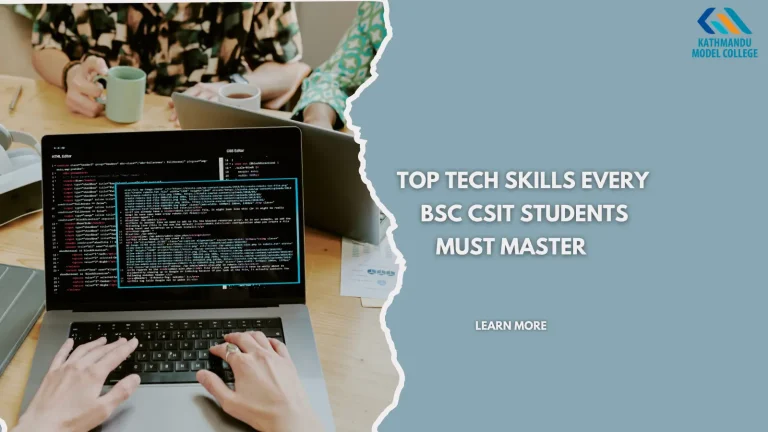
Top 10 Tech Skills to Learn During BSc. CSIT
BSc. CSIT is one of the most popular tech degrees in Nepal today.
It gives students a strong base in computer science and IT, but just studying course books isn’t enough.
The real-world IT job market looks for practical skills, things you can actually do, not just what you know.
Learning extra technical skills during your CSIT journey helps you stand out from thousands of graduates every year.
You can start freelancing, join internships, or even build your own projects.
The earlier you start exploring tech skills like programming, web development, or AI, the more confident and career-ready you’ll become after graduation.
Learn more about BSc. CSIT or BCA – Which Is Better for an IT Career in Nepal?
1. Programming Languages (C, C++, Python, Java, JavaScript)
Programming is the heart of computer science.
Without coding, nothing works in IT. In the first few semesters of BSc. CSIT, you’ll learn C and C++, which are great for understanding the logic behind programming.
Once you’re comfortable, move toward Python for data science or JavaScript for web development.
Java is another powerful language for app and backend development. Instead of trying to learn all at once, master one language deeply first.
Then, learning from others will become much easier.
Practice regularly by building small projects like calculators, games, or management systems.
These skills will make you ready for internships, hackathons, and real-world software jobs in Nepal’s growing tech industry.
2. Web Development (Frontend + Backend)
Web development is one of the most accessible and rewarding skills for CSIT students to learn. Every business, from schools to startups, needs a website today.
Start with HTML, CSS, and JavaScript to build beautiful, responsive websites.
Once you’re confident, explore frameworks like React for frontend and Node.js or Express.js for backend development.
Learning both sides will make you a full-stack developer, a highly demanded skill in Nepal.
Try creating your own portfolio website or a college project website to showcase your learning.
By the time you reach your final year, you could already be freelancing or working part-time as a web developer.
3. Database Management (SQL & NoSQL)
Every app or website you see stores and manages data somewhere; that’s where databases come in.
Learning Database Management Systems (DBMS) is essential for all CSIT students.
You’ll study SQL in your course, but it’s important to practice tools like MySQL and PostgreSQL.
Once you understand relational databases, also explore NoSQL options like MongoDB, which are popular in modern web and mobile apps.
Knowing how to design, store, and query data efficiently helps you become a complete developer.
Start small, like making a student record system, and connect your database with your web or desktop projects.
This hands-on learning will make your concepts stronger and your resume more impressive.
Read more about Top Career Opportunities After ACCA
4. Data Science & Machine Learning
Data is the new fuel of the digital world, and data science is all about using that fuel smartly.
For CSIT students, learning Python, along with libraries like NumPy, Pandas, and Matplotlib, opens the door to data analysis and visualization.
Once you’re comfortable with that, explore machine learning using Scikit-learn or TensorFlow.
These tools help computers learn patterns and make predictions, like spam detection or movie recommendations.
In Nepal, companies are slowly adopting data-driven decision-making, so data scientists are in growing demand.
Start by analyzing small datasets (like student marks or COVID data) to practice.
With time, you’ll understand how powerful data can be in shaping real-world decisions.
5. Cloud Computing & DevOps
Cloud computing enables apps and websites to run smoothly across the globe.
Instead of storing everything on your computer, businesses use cloud services like AWS, Google Cloud, or Microsoft Azure.
As a CSIT student, learning how to deploy apps on the cloud can set you apart.
Alongside this, DevOps teaches you automation, teamwork, and how software development and IT operations work together.
Tools like Docker, Git, and Jenkins are used in the process.
In Nepal, many IT companies are adopting cloud-based systems, so having these skills gives you an edge.
You can start by hosting your personal projects or websites on the cloud to understand how deployment works.
6. Cybersecurity & Ethical Hacking
With the rise of online banking, e-commerce, and digital systems in Nepal, cybersecurity has become more important than ever.
Learning how to protect computers, networks, and data from attacks can turn you into a real-life digital hero.
As a CSIT student, understanding ethical hacking, network security, and encryption is valuable.
You can start with tools like Wireshark, Kali Linux, and Metasploit to explore how systems are tested for weaknesses.
Ethical hacking isn’t about breaking into systems; it’s about securing them.
There’s a growing demand in Nepal for cybersecurity experts, both in the government and private sectors.
It’s a perfect skill for those who love solving puzzles and thinking like an attacker for a good cause.
7. UI/UX Design
Even the best software fails if users find it confusing; that’s why UI/UX (User Interface and User Experience) design matters.
It’s about making apps and websites look attractive and easy to use.
For CSIT students, learning tools like Figma, Adobe XD, and Canva can help you design stunning interfaces.
A developer who understands design can build apps that people actually enjoy using.
You don’t need to be an artist, just learn basic design principles like color balance, spacing, and typography.
Try redesigning popular apps or creating mockups for your college projects.
In Nepal’s startup scene, UI/UX designers are in high demand, and it’s a creative skill that complements your technical knowledge.
Learn more about Foundation Courses for CA Aspirants in Nepal (Before CAP-I)
8. Artificial Intelligence & Automation
Artificial Intelligence (AI) is one of the most exciting fields in technology today.
It’s what powers tools like ChatGPT, self-driving cars, and even smart assistants like Alexa.
For CSIT students, learning AI basics can open doors to innovative projects and research.
Start by exploring Python, NumPy, and TensorFlow, and understand how algorithms help machines “think.”
Automation, on the other hand, is about making tasks run automatically using scripts or AI models.
In Nepal, AI is slowly being used in fintech, health, and education sectors.
Even small student projects like chatbots or image recognition apps can help you understand how AI changes the world around us and improves everyday life.
9. Soft Skills & Communication
Technical knowledge alone isn’t enough in today’s job market; you also need strong soft skills.
These include communication, teamwork, leadership, and time management.
As a CSIT student, you’ll often work on group projects or internships, so learning how to explain your ideas clearly and listen to others is important.
Good communication helps you shine in interviews and presentations, too.
Try joining college clubs, tech events, or volunteering in group projects to build confidence.
Many Nepalese employers look for professionals who are not only technically smart but also easy to work with.
Developing soft skills early will help you stand out, whether you work in a company or start your own tech venture.
10. Freelancing & Startup Skills
One great advantage of learning tech is that you can earn while studying.
Freelancing allows you to work on global projects from your home in Nepal.
Platforms like Upwork, Fiverr, and Freelancer are perfect for CSIT students who know programming, web design, or content writing.
Start small, build your portfolio, and gather client reviews.
Alongside freelancing, develop entrepreneurial skills to create your own startup ideas.
Nepal’s tech ecosystem is growing, and young minds are launching innovative apps and services every year.
With the right mix of skills, confidence, and consistency, you can build a successful freelance career or even your own tech business before graduation.
Learn more about Is BSc.Agriculture Still Relevant in 2025 & Beyond?
Start Early, Stay Consistent
BSc. CSIT offers amazing opportunities, but only if you use your four years wisely.
Don’t wait until your final year to explore these skills.
Start early, stay curious, and practice daily.
The tech field grows fast, so consistency is the key to staying ahead.
Learn from YouTube, join online courses, attend local workshops, and connect with communities like the CSIT Association of Nepal.
Remember, every big developer, designer, or data scientist started small.
The goal isn’t to learn everything at once; it’s to keep improving, step by step.
By the time you graduate, you won’t just have a degree, you’ll have the skills, confidence, and experience to build your dream career.
Frequently Asked Questions (FAQ)
1. Which is the best skill to start with during a BSc. CSIT?
If you’re just starting your CSIT journey, begin with programming, especially Python or C. These languages are beginner-friendly and help build your logical thinking. Once you’re comfortable, you can explore other areas like web development, data science, or AI.
2. Can I start freelancing while studying a BSc. CSIT in Nepal?
Absolutely! Many CSIT students in Nepal earn through freelancing while studying. Start by learning practical skills like web development, graphic design, or app development. Create a strong portfolio and join platforms like Upwork, Fiverr, or LinkedIn to find clients.
3. Do I need expensive courses to learn these tech skills?
Not at all. You can learn most of these skills for free or low cost. Platforms like YouTube, Coursera, Udemy, and FreeCodeCamp offer quality tutorials. The key is consistency and practice, not expensive courses.
4. Which skill has the most demand in Nepal right now?
Currently, skills like web development, mobile app development, and cybersecurity are in high demand in Nepal. However, areas like data science and AI are also growing fast. Choose a field that truly interests you; that’s where you’ll succeed the most.
5. How can I stay updated with the latest tech trends in Nepal?
Follow local tech communities like CSIT Association of Nepal (CSITAN), attend hackathons, tech meetups, and connect with people on LinkedIn. Joining local IT events and seminars helps you learn from experts and stay updated with Nepal’s tech scene.

























